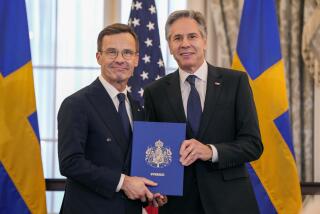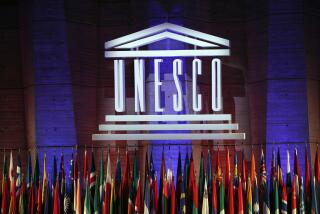Yugoslavia Rejoins U.N. After 8 Years
- Share via
UNITED NATIONS — The Federal Republic of Yugoslavia rejoined the United Nations on Wednesday, ending eight years in diplomatic limbo brought on by the world body’s declaration that the country had ceased to exist when the Balkans fractured in the early 1990s.
Newly elected President Vojislav Kostunica sent a letter to Secretary-General Kofi Annan on Friday asking that Yugoslavia be admitted to the U.N. He cited “fundamental democratic changes” in his country and pledged to fulfill the obligations of the U.N. Charter.
Goran Svilanovic, an envoy from Yugoslavia who is expected to become the new foreign minister, came to the U.N. on Wednesday to accept admission and present his country’s current flag. Yugoslavia’s pre-1992 banner, with its Communist red star, has been flying in front of the U.N. building for the past eight years.
“We understand the resolution you have just adopted as support of the profound democratic changes in Yugoslavia,” Svilanovic told the General Assembly.
Milosevic was driven from power last month by an uprising after he rejected his electoral defeat.
Although Yugoslavia was a founding member of the United Nations in 1945, its membership was suspended in 1992 after the secession of Bosnia-Herzegovina, Croatia, Slovenia and Macedonia from its federation. The four former republics became U.N. member states in their own right, but the government of former Yugoslav leader Slobodan Milosevic refused to reapply for membership, claiming that it was the original nation’s legitimate successor.
Yugoslavia maintained a mission here, though its representatives were not allowed to vote or speak in the General Assembly or sit in the chair behind the Yugoslavia nameplate. Kostunica has recalled the charge d’affaires and will appoint a new ambassador.
In a show of support for the newly democratic country and its president, the four former republics were among the sponsors of Yugoslavia’s membership.
“There is sometimes a turning point in history after which nothing remains the same,” said Agim Nesho, the ambassador of Albania to the U.N. “This step is a good start for the new [Yugoslav] authorities and gives cause for optimism that they will depart from the other failed policies of the Milosevic regime.”
Yugoslavia is now made up of two republics: the dominant Serbia and the smaller, pro-Western Montenegro. The federation won admission to the U.N. in just three working days, despite requests from the Montenegrin leadership for a delay.
Montenegrin President Milo Djukanovic said on television Tuesday that the two republics should each have a U.N. seat and should function as a loose union of internationally recognized states. However, he said Montenegro will not stand in the way of the international community’s efforts to admit Yugoslavia to the international family.
*
* ACTIVIST FREED
Ethnic Albanian activist Flora Brovina returned to Kosovo after her release from prison. A6
More to Read
Sign up for Essential California
The most important California stories and recommendations in your inbox every morning.
You may occasionally receive promotional content from the Los Angeles Times.













